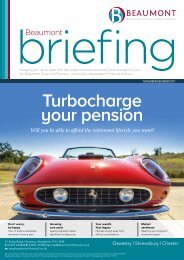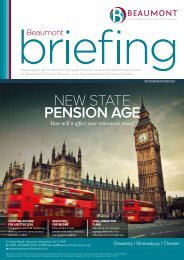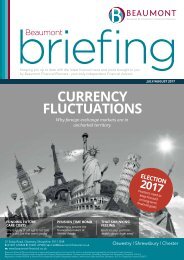sm74 (3)
You also want an ePaper? Increase the reach of your titles
YUMPU automatically turns print PDFs into web optimized ePapers that Google loves.
BREXIT<br />
STERLING CORRECTION MIGHT<br />
HAVE BEEN EXPECTED<br />
The performance of sterling has demonstrated<br />
just how predictions can be flawed. It is true that<br />
it has weakened, but a falling pound has made<br />
UK exports much more attractive to the rest<br />
of the world. Prior to the referendum, sterling<br />
had risen to a level that some experts believed<br />
was unsustainable. Even without the Brexit vote,<br />
a correction might have been expected.<br />
Current UK interest rates restrict its appeal<br />
relative to other currencies, especially the<br />
dollar, as the US has already begun increasing<br />
its own central rate. A low-value pound could<br />
therefore continue, with UK exports and the<br />
FTSE showing the benefits.<br />
IF BREXIT ANXIETY<br />
BECOMES A REAL CONCERN<br />
With the growth of the UK economy<br />
continuing, the UK interest rate could also be<br />
ready for an increase. Some consider this will<br />
not happen until next year. Even if there is<br />
strong economic growth, the Bank of England<br />
could leave rates alone if Brexit anxiety<br />
becomes a real concern.<br />
Savings rates fell to record lows in the wake<br />
of the Brexit vote, helped on their way by the<br />
Bank Rate decision in August 2016. Again,<br />
the triggering of Article 50 is unlikely to make<br />
much difference. Savings rates may already be<br />
on the way back up, although even the best<br />
performers are still struggling to beat inflation.<br />
AMERICAN ECONOMY MAY HAVE A<br />
MORE SIGNIFICANT EFFECT<br />
Savings rates do not move as rapidly as stock<br />
markets, so they are unlikely to respond until<br />
concrete facts emerge about the eventual deal.<br />
Other factors, such as the success or otherwise<br />
of the American economy under President<br />
Trump, may have a more significant effect.<br />
In the short term, Brexit is unlikely to have a<br />
significant impact on the legal and regulatory<br />
framework for UK pension plans. It does,<br />
however, open the door for UK legislation to<br />
deviate from EU requirements in the future.<br />
DIVERSIFICATION WILL HELP<br />
PROTECT INVESTMENTS<br />
Looking towards the future, diversification will<br />
help protect investments from the full impact of<br />
market volatility, but it’s important that investors<br />
don’t over-worry about disruptive events or<br />
financial crises that are unlikely to happen and<br />
play it too safe in their asset allocation.<br />
With the pound falling against other currencies,<br />
it means that overseas investments produce an<br />
additional benefit when they are converted into<br />
sterling. People who feel pessimistic about the<br />
UK economy or their own personal finances are<br />
more likely to plan to save more over the next<br />
12 months to ensure they have a financial safety<br />
net, according to a Zurich survey [1] .<br />
HOW PEOPLE FEEL<br />
ABOUT THE ECONOMY<br />
The findings suggest that current affairs have<br />
a significant impact on how people feel about<br />
the economy, with the two sides of the Brexit<br />
argument currently feeling very different about<br />
the future. Six in ten (60%) remain voters<br />
said they felt pessimistic about the economic<br />
outlook of the UK compared to just over one in<br />
five (22%) of those who chose to leave.<br />
This negative attitude is also having an effect<br />
on how people view their own finances and<br />
how they plan to save. When asked about their<br />
personal financial situation, 32% of remain<br />
voters feel pessimistic compared to 27% of<br />
leave voters.<br />
YOUNGER PEOPLE MORE<br />
LIKELY TO FEEL PESSIMISTIC<br />
Over a quarter (26%) of remain voters expect<br />
to save more money in the coming year.<br />
Meanwhile, less than one in five (19%) leave<br />
voters said they planned to save more, while<br />
27% expect to save less in the next year.<br />
Further to this, younger people appear more<br />
likely to feel pessimistic about the economy<br />
and therefore intend to increase their savings.<br />
As such, just under half (49%) of 18 to<br />
24-year-olds say that they are aiming to save<br />
more money in the next 12 months, compared<br />
to just 13% of 50 to 64-year-olds. t<br />
THE NEED FOR SOLUTIONS AND<br />
PROFESSIONAL FINANCIAL ADVICE<br />
With Article 50 now triggered and the<br />
negotiations beginning, the effects of the next<br />
stage of Brexit may be just as difficult to predict.<br />
The triggering of Article 50 continues to highlight<br />
the need for solutions and professional financial<br />
advice that will support you in achieving your<br />
investment goals in the short to medium term.<br />
To discuss any aspect of your financial plans in<br />
the light of Brexit, please contact us.<br />
Source data:<br />
[1] Zurich UK survey of over 4,000 adults across<br />
the UK, 24 March 2017<br />
THE VALUE OF INVESTMENTS AND INCOME<br />
FROM THEM MAY GO DOWN. YOU MAY NOT<br />
GET BACK THE ORIGINAL AMOUNT INVESTED.<br />
PAST PERFORMANCE IS NOT A RELIABLE<br />
INDICATOR OF FUTURE PERFORMANCE.<br />
07
















